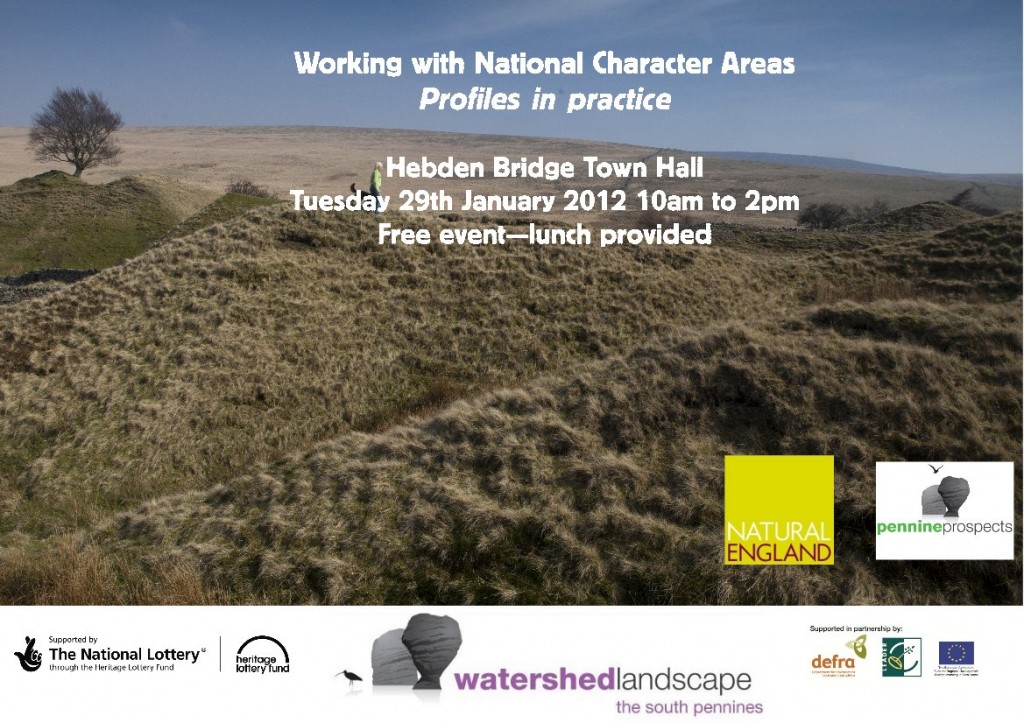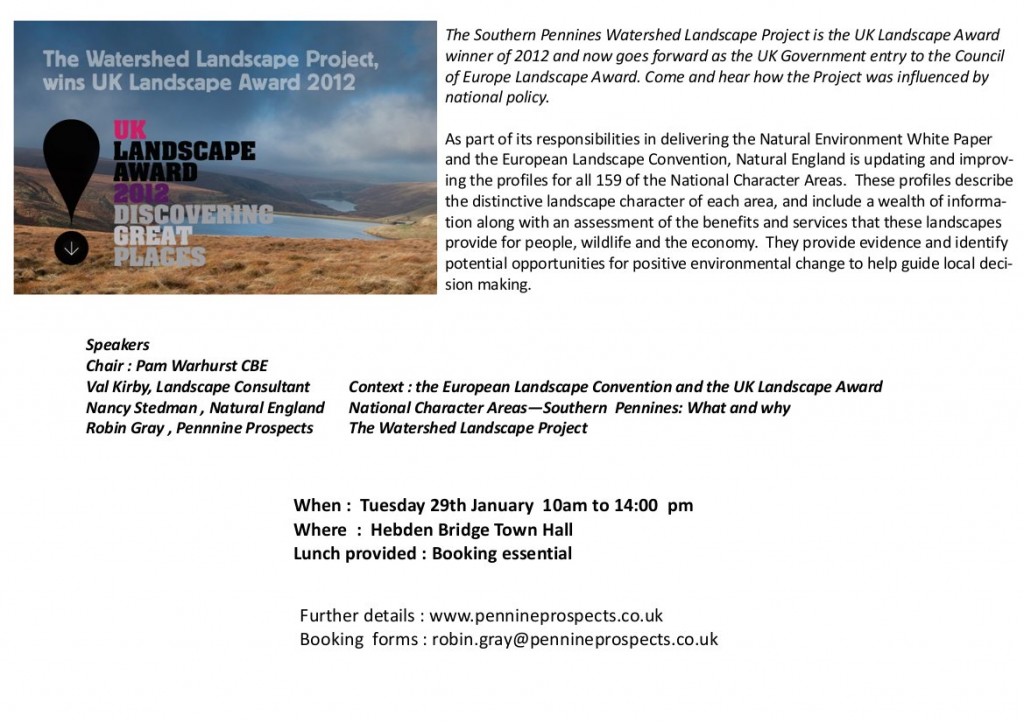Ban the Burn! members and supporters might like to attend the free South Pennines National Character Area Profiles Workshop. This Pennine Prospects/Natural England workshop is about how the South Pennines Watershed Landscape Project has been influenced by Natural England’s update of the South Pennines National Character Area (NCA) profile.
The workshop takes place on Tuesday 29th January, 10am-2pm, at Hebden Bridge Town Hall. It is free, with lunch provided, and open to all, but you need to book in advance by emailing robin.gray@pennineprospects.co.uk or phoning 01422 847612, or 07582 101319.
Speakers include Nancy Stedman, Natural England Senior Adviser and Robin Gray, Watershed Landscape Project Manager
South Pennines NCA Profile commits Natural England to restore degraded blanket bog
Many elements of the South Pennines NCA Profile are of interest to Ban the Burn. They show Natural England’s commitment in principle to:
- safeguard, manage and enhance the moorland, and the internationally important habitats and species it supports, as well as protecting soils and water resources
- restore degraded areas of blanket bog to active sphagnum-dominated bog to promote peat formation
- stabilise, re-wet and revegetate all eroding peat soils
- retain water or manage run-off by re-wetting moorland (e.g. through blocking grips) to bring blanket bog back into favourable ecological and hydrological condition
European Commission is investigating the legality of Natural England’s award of £2.5m environmental funding to Walshaw Moor Estate, and consent to blanket bog burning
While the South Pennines NCA profile commits Natural England to restoring degraded blanket bog, Ban the Burn has presented a dossier of evidence to the European Commission about Natural England’s probably unlawful consent to blanket bog burning on Walshaw Moor Estate.
The consent is based on Natural England’s environmental impact assessment, called an Appropriate Assessment. The Appropriate Assessment concluded that WME’s proposed blanket bog burning will not have an adverse effect on the integrity of the South Pennine Moors Special Area of Conservation (SAC) & the Special Protection Area (SPA) features. (The SAC and SPA features are basically the protected habitats and protected birds.)
The Appropriate Assessment has to meet a required legal test, that no scientific doubt remains that the grouse shooting operations will not adversely affect the integrity of the protected site, with its internationally important blanket bog and protected wildlife.
Information gained through Environmental Information Regulations requests provides strong evidence that Natural England’s Appropriate Assessment does not satisfy this key legal test.
Under the 2010 Habitats Regulations, the Defra Secretary of State shares responsibility with Natural England for this Appropriate Assessment.
Reasons to doubt the legality of the Appropriate Assessment are given here ( about half way down the page, below the Heather burning photo)
The European Commission is questioning the UK government about the legality of the Appropriate Assessment, and the £2.5 million WME Environmental Stewardship Agreement (ESA).
South Pennines NCA Profile recognises “adverse impact on biodiversity” of poor moorland management
The South Pennines NCA Profile identifies these problems and opportunities in relation to moorland management:
- in places poor management, including drainage and burning on short rotations, has had an adverse impact on the biodiversity of internationally important blanket bog and wet heath communities; where excessive or unregulated burning has taken place this has led to the dominance of moorland habitats by single species, in particular by purple moor grass (Molinia caerulea)
- sphagnum mosses are quite rare on blanket bog, primarily as a result of overgrazing, overburning and atmospheric pollution
- a key issue is how to negotiate appropriate moorland management regimes between the various interests, including game production, livestock and water supply
- flood risk management will result in land management changes – some 50% of the area is defined as moderate to high flood risk where the Environment Agency plans to take further action to reduce flood risk.
Creating “ecosystems” markets
Natural England has helped shape the South Pennines Watershed Landscape Project as part of its work in promoting the 2012 Natural Environment White Paper, a highly business- driven set of proposals to create a market in the benefits human beings find in natural resources.
To do this, the White Paper defines the benefits as “ecosystem services” and puts a price on them. For example, the National Ecosystem Assessment 2011 calculated that in 2060, parks and green spaces will enhance human wellbeing to the value of £290 per household per year.
Here’s some information about York University’s research programme into Biodoversity and Ecosystem Service Sustainability (BESS):


